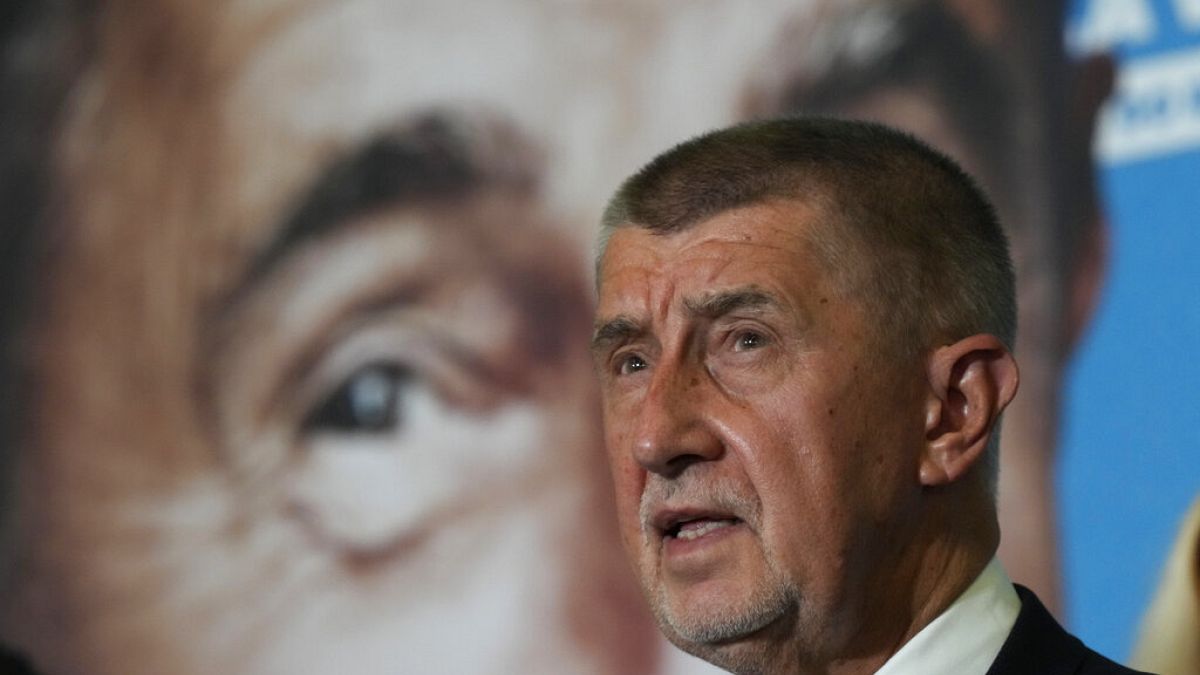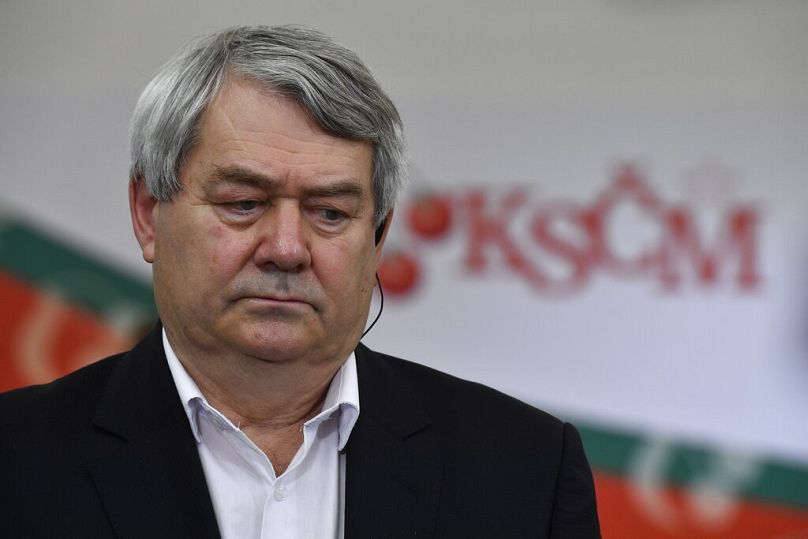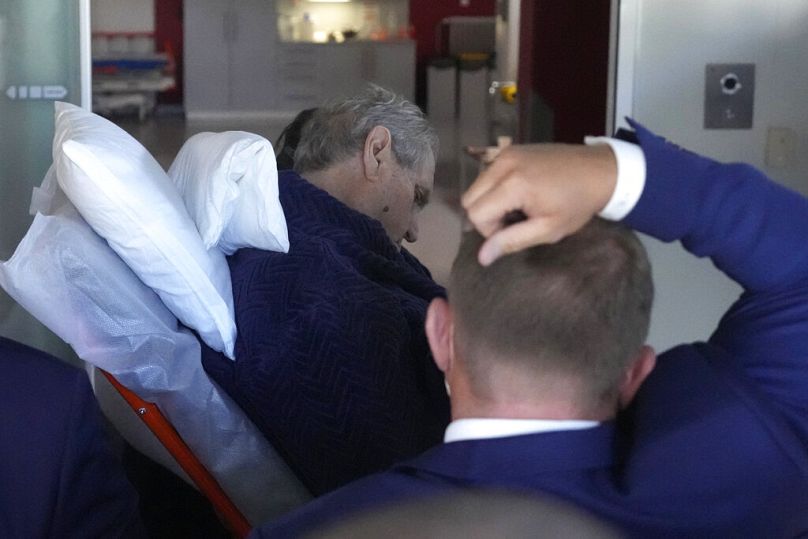Here are the key points to help you understand the Czech election and what it means for Europe.
1. Babis loses the popular vote and likely the election
At a general election hailed as a victory for liberal democracy in the Czech Republic, incumbent Prime Minister Andrej Babis’ ruling party was defeated in the popular vote by a new centre-right alliance that looks set to form the next coalition government.
The ruling ANO party won one more seat than the SPOLU alliance at this weekend’s general election but appears unlikely to be able to find partners to command a majority in the Chamber of Deputies, signalling the creation of a coalition government between SPOLU and another political alliance.
However, Babis is still tipped to be appointed prime minister by President Milos Zeman and, with him expected to then lose a vote of confidence in parliament, it could take several months before a new government is formed.
Zeman, who now plays the role of kingmaker, was taken to hospital on Sunday afternoon after weeks of poor health and is reportedly in intensive care. If unable to perform his duties, it would likely spell the end of Babis’ political career and speed up the formation of the next government.
SPOLU was created earlier this year by three parties, including the Civic Democrats (ODS), the country’s second-largest party going into the ballot.
Ahead of the election, the SPOLU alliance said they would agree to work in a coalition government with another new political alliance formed this year between the Pirate Party (PIR) and the Mayors and Independents party (STAN). The PIR-STAN alliance won 37 seats, the third-largest share, at this weekend’s election.
The SPOLU and the PIR-STAN alliances have branded themselves a “democratic bloc” against the allegedly illiberal ANO and far-right Freedom and Direct Democracy party (SPD), the latter of which won just under 10% of the vote. The two alliances combined now control 108 seats in the 200-member Chamber of Deputies.
Voter turnout was up to near 65%, compared with 60% at the last legislative election in 2017.
“The result is a surprise but not a total bombshell,” said Sean Hanley, an associate professor in Central and Eastern European politics at University College London. Most opinion polls before the election gave ANO a five percentage point lead over SPOLU but it ended up trailing to the centre-right alliance by around 0.6 points.
According to Hanley, the “illiberal culture war” ANO launched might have backfired. Babis ramped up his anti-immigration rhetoric before the ballot and last month invited the controversial Hungarian Prime Minister Viktor Orban, the architect of an apparent “illiberal democracy”, to a campaign rally.
Babis, a billionaire and the Czech Republic's second-richest man, has tended to swing across the political spectrum. But his campaign was dogged by corruption allegations. A European Commission audit earlier this year found him to be in conflict of interest over how his Agrofert conglomerate accepted subsidies from Brussels.
There are ongoing investigations within the Czech Republic over his alleged graft, and a few days before the election he was put under pressure to explain a convoluted offshore structure he used to purchase a €15m mansion in the south of France, as disclosed in the “Pandora Papers”, the largest ever trove of leaked offshore data.
2. Historic firsts as communists and social democrats fail to enter parliament
For the first time since 1920, the Czech parliament won’t have communist delegates after the Communist Party of Bohemia and Moravia (KSCM) failed to win more than 5% of the vote, the threshold needed to enter parliament.
The country’s oldest political party, the Social Democrats (CSSD), also failed to enter parliament for the first time in its history.
Pundits reckon that ANO sapped left-wing voters from its outgoing coalition partner, the CSSD, as well as from the far-left KSCM, which had backed Babis’ government in parliament since 2018. On the campaign trail, Babis frequently spoke about his government raising the minimum wage and pensions, a key policy for the mainly left-wing elderly vote.
After failing to enter parliament for the first time since the Czech Republic was formed in 1993, the leaders of the CSSD, Jan Hamacek, and of the KSCM, Vojtech Filip, resigned on Saturday evening.
3. Centre-left Pirates all at sea after a poor performance
The culture war campaign seems to have damaged the centre-left Pirates, who were on the receiving end of most of Babis’ tirades and from the numerous media outlets the incumbent prime minister owns, said Hanley.
The Pirate Party picked up only four seats in their new alliance, down from the 22 they won at the last general election in 2017.
However, his illiberal rhetoric may also “helped to mobilise anti-Babis voters behind SPOLU, which stressed that he was a threat to democracy from the get-go,” Hanley added.
Despite SPOLU and the PIR-STAN alliances now commanding a majority of seats, analysts expect a protracted post-election standoff and it could take months before the Czech Republic has a new government.
Within an hour of the count ending at 2 pm on Saturday, the SPOLU alliance’s leader Petr Fiala, who is likely to become the next prime minister once the post-election chaos ends, said he would start coalition talks with the PIR-STAN alliance.
However, it was a tightly-fought affair. With around 70% of districts counted at 4 pm on Saturday, it looked as though ANO was heading for a narrow victory. But most districts in Prague had not yet been counted and ANO was trailing in third place in the capital city. At 5 pm, ANO still had a 1.8 percentage point lead on SPOLU. An hour later, it fell to just 0.4 points.
In the end, SPOLU won the popular vote by just 35,000 ballots. But the Czech Republic’s proportional representation system meant that ANO picked up 72 seats to SPOLU's 71.
Had the anti-corruption Prisaha party or the CSSD earned 0.3% and 0.4% more of the vote, respectively, they would have entered parliament and most likely would have made some deal with ANO.
4. Opposition coalition could be too unwieldy to govern effectively
David Klimes, a leading political commentator, argued on Sunday the SPOLU and PIR-STAN bloc are “now celebrating deservedly, but we are not sure how long the euphoria will last”.
Indeed, even if they can successfully prevent Babis from maintaining power, it will be an uphill struggle for the two alliances, which have very different political interests, to find common ground.
“Perhaps Zeman, assuming he is well enough, might come up with some kind of conditions such as the exclusion of Pirates,” said Hanley. Or he could refuse to accept certain ministers or prime ministerial nominations.
“But sooner or later, I think a Spolu/Pir-stan coalition will emerge,” Hanley added. “The key question may then be how stable it will be given the five parties involved.”
The Czech Republic has a history of two- or three-party coalitions, but not of five parties. SPOLU is composed of the ODS, as well as the Christian Democrats (KDU-CSL) and the centrist TOP-09.
The three have found common ground on a shared manifesto, but it will be more difficult to find commonalities with the PIR-STAN alliance, whose manifesto was at odds with the centre-right group.
While SPOLU has a pro-business, low-tax agenda, the PIR-STAN alliance has called for progressive policies. Fiala, the SPOLU leader and likely next prime minister, has in the past accused the Pirates of being “neo-Marxists”.
But this could be made easier as the election was a “tragedy” for the Pirate Party, the third-largest party going into the ballot, said Kostelka. Although the PIR-STAN alliance won 37 seats at this weekend’s election, only four of those seats went to Pirate candidates, meaning it lost 18 seats and became the smaller partner of the alliance. The leader of STAN, Vit Rakusan, won more preferential votes than Babis.
5. Zeman's poor health could stymie Babis' post-election power grab
President Zeman must now appoint a prime minister who must then go to parliament for a vote of confidence. Prior to the election, Zeman said that he would offer the prime minister role to the leader of the largest party, not the largest alliance. With ANO’s 72 seats that means Babis.
However, if nominated then Babis will most likely lose a vote of confidence in parliament, given the majority of seats are now commanded by SPOLU and the PIR-STAN alliance.
It is possible that Zeman could keep Babis as prime minister without parliament’s approval until the next presidential election in January 2023, although SPOLU politicians have said they will try to remove Zeman through the Constitutional Court if that happens.
It was widely speculated in the build-up to the election that Babis could have been forced to do a deal with the far-right SPD, which picked up 20 seats in parliament, a loss of two from the previous legislative election. But an ANO-SPD pact would still have a minority of seats in parliament.
One alternative for Babis would be to try to break the Spolu alliance. Rumours circulated before the election that the ODS could defect from the democratic camp post-election, said Filip Kostelka, a lecturer at the University of Essex.
Of the 71 seats, Spolu won this weekend, the ODS controls 33. As such, a hypothetical ANO-ODS pact would command the majority of seats in parliament. Sources say that a condition would be for Babis to resign as ANO leader, perhaps in return for clemency in ongoing anti-corruption investigations. Babis said on Saturday he will leave politics if ANO enters parliament in opposition.
However, it would be “political suicide” for the ODS to break from the Spolu alliance and ally with ANO, said Kostelka. Indeed, ANO’s popularity depends on the personal appeal of Babis and, if him leaving politics is the condition of an ANO-ODS pact, then ANO’s support would collapse at subsequent elections.
“Zeman will want to give Babis time to break the election coalition Spolu and he will try to persuade the ODS. But Babis has very little chance of success,” said Lubomir Kopecek, a professor of political science at Masaryk University.
The main issue complicating post-election negotiations is Zeman’s health, Kopecek added. Now wheelchair-bound, the 77-year-old was unable to leave Lány Chateau, the President's residence, to vote on Saturday and is believed to be suffering from liver problems.
At midday on Sunday, just after meeting with Babis, Zeman was taken by ambulance to Prague’s Central Military Hospital. A physician told a press conference that Zeman was being treated in an intensive care unit.
“If Zeman delays the formation of the government too much, he can face the threat of losing powers due to his inability to exercise them,” Kopecek said, meaning Babis’ might not have weeks or months he would need to try to engineer a way of staying in power.
In the event that Zeman has to resign as president over health concerns or passes away, the head of state position would be taken up either by the president of the Chamber of Deputies or of the Senate, the upper house. The latter would take on the role if the president vacates office before the new Chamber of Deputies reconvenes.
Either way, the current Senate president, Milos Vystrcil, is from the Spolu alliance’s ODS party, and the next president of the Chamber of Deputies will also likely be a member of the centre-right alliance.
6. Czechs will likely turn back to the West and stop their flirtation with Russia/China
If Spolu and the Pir-Stan alliance do form the next government it “will mean a stabilization of Czech democracy and a strong confirmation of its Western commitments, to the EU and NATO,” said Kostelka.
It will also mean the Czech Republic avoids a standoff with the EU. Earlier this year, a European Commission audit found Babis to be in conflict of interest over his Agrofert conglomerate accepting subsidies from Brussels. The audit found that Babis still made decisions at the company despite him formally putting his interests into a trust fund when he became prime minister in 2017.
The European Commission had threatened to delay vital payments to the Czech Republic unless it made key reforms to its anti-corruption laws, and a second term in office for Babis would have escalated tensions with Brussels.
“It seems likely that the Czech government’s foreign policy will become more consistently aligned with the EU and the US,” said Richard Q. Turcsanyi, a programme director at the Central European Institute of Asian Studies at Palacky University Olomouc.
It would also signal the end of friendly missives towards China or Russia, Turcsanyi said but added that Zeman, the leading architect of the pro-China and pro-Russia agenda, could remain president until January 2023.
“Overall, the election outcome is good news, or even a triumph, for liberal democracy,” said Kostelka.


